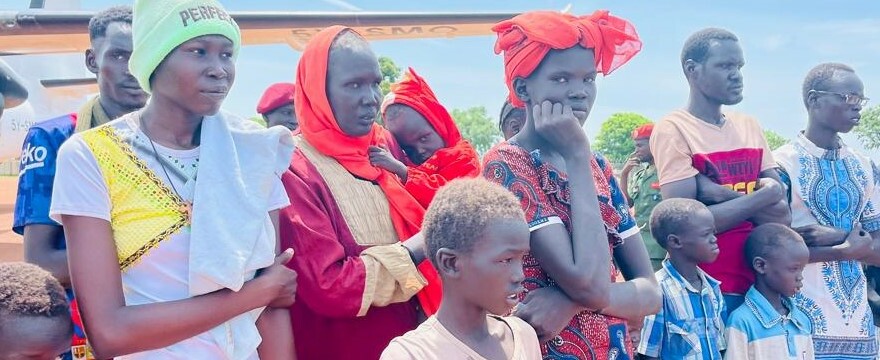The authorities of Warrap State on Monday received a total of 301 returnees. Among them were 151 individuals who had returned from Paloch town of Upper Nile State and another 150 from Aweil in Northern Bahr el Ghazal State.
These recent arrivals have contributed to a total of 4,889 new arrivals in Warrap State since April.
The influx of returnees is a result of the escalating conflict in Sudan. The clashes that initially erupted on April 15 between the paramilitary Rapid Support Forces (RSF) and the government-backed Sudan Armed Forces (SAF) have now evolved into a full-fledged war. The devastation caused by this conflict has not only affected the capital city, Khartoum, but has also spread to various cities across the Darfur region.
The leaders of the Rapid Support Force (RSF), Mohamed Hamdan “Hemedti” Dagalo, and Sudan’s de facto leader and army chief, Abdel Fattah al-Burhan, have been unable to resolve their disputes, leading to the mass exodus of both Sudanese and South Sudanese citizens who were residing in Khartoum.
Upon receiving the returnees at Kuajok airstrip, Governor Manhiem Bol Malek emphasized their immediate need for food and essential items. He stated, “We received 301 returnees today, including those who fled the war in Khartoum. They are in desperate need of food and non-food items. Additionally, there are over 150,000 stranded returnees in Warrap who are facing food shortages and reports of fatalities.”
Governor Bol appealed to the national government and humanitarian organizations to extend their support to the returnees both before and after their integration into local communities.
He stated, “We are glad to have received our people, and I urge the Ministry of Humanitarian Affairs, alongside my efforts and those of humanitarian organizations, to join hands and provide assistance to the returnees. Although we currently lack proper camps, we will temporarily accommodate them at the RRC compound before facilitating their integration.”
Benjamin Anyar, the chairperson for the Relief and Rehabilitation Commission (RRC), acknowledged the increased number of returnees in the state due to the Sudanese war. He called upon development partners to address the living conditions of vulnerable individuals.
Anyar expressed gratitude towards organizations such as World Vision, Action Against Hunger, and TOCH for providing non-food items, while the state government has taken responsibility for supplying food to the returnees prior to their integration.
Some of the returnees shared harrowing stories of their experiences in Upper Nile, highlighting the lack of clean water and insufficient food that resulted in numerous deaths.
Ajak Mayom, a returnee from Twic County, recounted their struggles, saying, “During the war, we moved from Khartoum to block 21 in Omdurman, Sota and then the free trucks from Jieng Council of Elders company transported us to Joda where vehicles of organizations brought us to Upper Nile University,” she said.
Mayom adds, “There was no clean drinking water. People would fetch water directly from the river and add chlorine tablets before drinking it. There is no food. People are boiling grains as food. That is why children have died from diarrhoea.”
“Some of the returnees remained there when we were crossing to the airport. People without white cards were not allowed to come to Paloch airport, and what can I say to the government because we left our country alone and went to Khartoum? It is now up to our government to decide what to do for us,” she lamented.
Mayom also expressed her concern for those left behind in Malakal, emphasizing the dire situation they are currently facing.
Aguek Deng, another returnee, echoed these concerns and appealed to the government to assist in bringing back the remaining individuals stranded in Malakal and Renk back to Warrap State.
The arrival of these returnees poses significant challenges, and immediate support from the government and humanitarian organizations is crucial to address their pressing needs and facilitate their integration into local communities.




